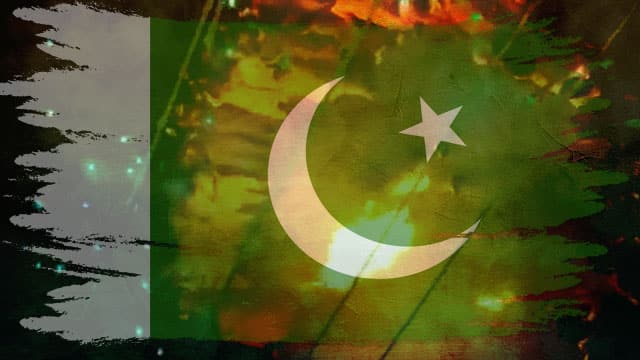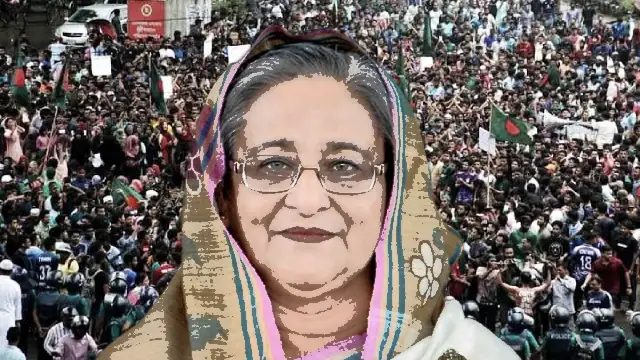Pakistan has again come to the news for all the wrong reasons. An Islamist fanatic mob lynched a tourist and then immolated him on suspicion of blasphemy on Thursday night in Madyan of Swat. The videos of a mob lynching in Swat became viral on social media. They highlighted the precarious state of law and order in Pakistan, where religious fanatics have been experiencing immense political aggrandisement.
The incident of mob lynching in Swat
According to news reports, the victim, identified as Mohammad Suleman, a Sunni Muslim from Sialkot, was visiting the tourist destination on the Eid holidays. He checked into the Skyways Hotel near Madyan Bridge on the Swat River on June 18.
The hotel management was quoted by Pakistani media saying that they handed over Suleman to the police after other guests alleged that they saw the burnt pages of the Muslim holy book of Koran in his room. However, many activists claim on social media that there was an announcement in the market accusing him of burning the Koran and then the locals handed him over to the police.
While the Swat police held the suspect in custody, announcements were made from the local mosques’ loudspeakers provoking the local Muslims to ‘punish’ the man for blasphemy.
According to media reports, the mob reached the Madyan Police Station demanding that the suspect be handed over to them. When the police refused they attacked the police station and set it and several vehicles ablaze.
Islam-ul-Haq, the station house officer (SHO) told the press that the mob arrived a few minutes after the accused was brought. The SHO claimed that Suleman claimed innocence and denied the allegations against him. He was shifted to the police quarters behind the station to save him from the mob’s fury. However, as the policemen ran away from the station to save their lives the mob reached the quarters and dragged the accused out, hitting him relentlessly.
Videos show a mob kicking the man’s motionless, blood-laced body and then setting it ablaze amid Islamist sloganeering.
Legal actions
The SHO claimed reinforcement was brought to disperse the mob and control the situation.
Two first information reports have been filed, one against the deceased and another against the mob. The police couldn’t arrest anyone so far for the mob lynching of the tourist in Swat, even though the incident caused an international furore and blotted Pakistan’s image once again.
Although the local business owners of the tourist destination blamed mischievous elements and a bigger conspiracy behind the mob violence, and the Pakistan Ulema Council (PUC) condemned the incident as ‘unIslamic’, the inaction of the state to curb the menace of fanatic mob violence remains the main culprit, according to a large number of Pakistani social media users, behind such violence.
The infamous blasphemy law and theocracy
Pakistan’s infamous blasphemy law, brought by the US-sponsored General Zia-ul-Haq’s regime in 1985, has been reportedly used for vindictive purposes and to settle personal scores across the country.
It’s the one that’s behind the mob lynching of the tourist in Swat on Thursday night.
Between 1987 and 2022, 2,120 people have been accused under the blasphemy act, which makes any kind of perceived ‘insult’ to Sunni Islam, its holy books and Prophet Mohammad an offence punishable by death.
This law has been used by Pakistan’s Islamic clerics, close to its Army and the government, to persecute the minority Hindus, Sikhs and Christians. Many have been killed in the last four decades in the unruly North Western parts of the country.
The Ahmadiyya Muslim sect has been a victim of this law as well.
Pakistan’s so-called ‘secular’ mask fell off in the late 1960s and early 1970s following the rise of Bengali nationalism in its eastern colony, which is now Bangladesh.
With the Saur Revolution in neighbouring Afghanistan in the late 1970s and the Soviet Union’s involvement, the Pakistani establishment openly started endorsing religious extremists driven by anti-communist frenzy at the behest of the US, which funded and aided both Islamabad and the ‘Mujahideen’.
Soon after the fall of the quasi-socialist Afghan state to the ‘Mujahideen’, and consecutively to the Pakistan-supported Taliban, the surplus militant Islamists were deployed by the Pakistani Army to stir trouble in the Indian part of the disputed Jammu & Kashmir region and elsewhere.
While most of the mainstream Pakistani political parties oppose Islamic fanaticism officially, for the sake of their political existence and growth, each of them has aided its growth during civilian rule.
While former prime minister Nawaz Sharif’s Pakistan Muslim League (Nawaz) or PML(N) has been infamous for its pro-Islamist ties, its opponent-turned-ally Pakistan People’s Party (PPP) couldn’t evade the lucrative trap of appeasing the Mullahs for petty political gains. Even former prime minister Imran Khan’s Tehreek-E-Insaf failed to differentiate itself from the PML(N) and PPP.
As the Islamist forces have strong ties with the Army, which has a strong influence on Pakistani politics, none of the political parties dare to provoke them by repealing the blasphemy law.
A dead economy
As a result, the Pakistani economy lacks foreign investment. According to the International Monetary Fund’s (IMF) data, Pakistan’s real GDP growth in 2023 was -0.2% and is expected to reach 2% in 2024.
While Pakistan’s GDP at current prices was $338.24bn in 2023, the general government debt-to-GDP ratio was 77.1% in 2023 and is expected to fall to 71.8% in 2024.
With the mob lynching in Swat bringing Pakistan to the hall of shame again, it’s to be seen how such incidents can impact its economy further.


